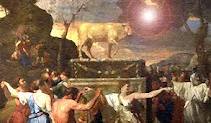Template:Sinincampcent

They were setting up covetous practices, a partially common purse, a central treasury, that could lead to the Corban of the Pharisees and a returning to Egypt and the way Nicolaitans as all socialist states do.
God endowed man with choice and the power to choose.[2]
We call that individual power of choice rights and liberty.
If we give that choice to others or the power to make choices for us, then we mock God. When the people put their wealth in this institution, this reserve fund set up by Aaron they no longer had direct power of choice over that wealth which God had given them when they left the bondage of Egypt.
- ↑ Covetousness is idolatry
- Colossians 3:5 "Mortify therefore your members which are upon the earth; fornication, uncleanness, inordinate affection, evil concupiscence, and covetousness, which is idolatry: 6 For which things’ sake the wrath of God cometh on the children of disobedience:"
- Ephesians 5:5 "For this ye know, that no whoremonger, nor unclean person, nor covetous man, who is an idolater, hath any inheritance in the kingdom of Christ and of God."
- 1 Corinthians 5:10 "Yet not altogether with the fornicators of this world, or with the covetous, or extortioners, or with idolaters; for then must ye needs go out of the world. 11 But now I have written unto you not to keep company, if any man that is called a brother be a fornicator, or covetous, or an idolater, or a railer, or a drunkard, or an extortioner; with such an one no not to eat."
- For it is written that the tables of dainties provided by rulers of the world are a snare because they cause the masses to bite one another through government systems of legal charity which are covetous practices which are a form of fornication or adultery where the people are devoured as merchandise, curse children and are "entangled again in the yoke of bondage" with the aid of the false religion of the whore who rides the beast.
- ↑ "Freedom is the Right to Choose, the Right to create for oneself the alternatives of Choice. Without the possibility of Choice, and the exercise of Choice, a man is not a man but a member, an instrument, a thing.” Archibald MacLeish